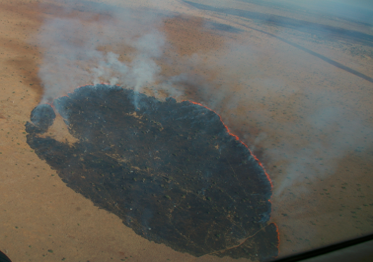A group of researchers from 26 universities and institutes working in Africa have warned conservationists, farmers and landowners to be cautious of consultants and companies recommending a single veld-burning strategy to sequester carbon in order to capitalise on carbon credits.
In a paper published this month in Nature Sustainability, titled ‘Viability, impact, and desirability of financing conservation in Africa through fire-abatement’, they challenge the feasibility of implementing early dry season (EDS) fires as a one-size-fits-all fire management strategy for African conservation areas. While proponents claim that this approach could reduce greenhouse gas (GHG) emissions, restore ecosystems, and generate significant carbon revenues to fund conservation, the paper argues that the ecological, climatic, and economic outcomes of such a strategy may not align with expectations, and more nuanced approaches are necessary.
Lead author Tony Knowles, from Cirrus, stresses that “there are some fantastic climate change mitigation projects, based on really good science, that are funding African conservation areas and programmes in surrounding communities, but we need to be careful about recommending actions when the science is not clear”. Cirrus is an advisory group that works with landowners across Africa on carbon revenue opportunities.
“Half of the GHG emissions from Africa are generated through land use, deforestation, and land degradation,” says Knowles. “As highlighted in recent IPCC reports, one of the principal mitigation opportunities is halting deforestation and the restoration of our landscapes. This also provides a good opportunity to generate carbon revenues for conservation agencies, farmers, and landowners.”
While there is a desperate need for funds to manage these landscapes and the restoration of indigenous grasslands and indigenous forests are strong legitimate carbon offset opportunities, there are a few emerging ideas that are contentious, says Knowles. One example is planting trees in indigenous grasslands. Another is the implementation of fire abatement in open, savanna or African rangeland systems.
The paper critically examines whether shifting fire regimes to the early dry season will achieve the dual goals of reducing emissions and financing conservation. The 31 researchers, largely from institutions and organisations in Africa, have reviewed the idea and found that it doesn’t work in an African context.
Explains fellow author Sally Archibald: “Early season burning is sometimes very appropriate, but it’s not accurate to say simply ‘if we do early season burning, we’re going to improve the ecosystem functioning and that’s going to store carbon which will make you money’.”
Archibald says there is insufficient evidence that early dry season fires do store carbon or reduce GHG emissions. These fires might also not be desirable ecologically:
“Managers are using fire to achieve a lot of different objectives: they need to control ticks, manage poaching, and eradicate invasive plants, while at the same time thinking about forage for their herbivores. None of those things give them revenue, and they do it for ecological reasons.”
Archibald, a Professor at Wits University’s School of Animal, Plant and Environmental studies and who leads the Future Ecosystems for Africa program, explains:
“It’s about keeping autonomy with managers as fire is one of the few tools that are available in places with few resources: it is effective and inexpensive. We worry that there’s going to be pressure to prioritise early burning above other management needs because it provides revenue”
“If there was overwhelming evidence that you could store significant carbon by burning early, then, yes, let’s balance those things. But recognise that there are a lot of good reasons to burn hot fires late in the season if you have a tick problem or you are trying to control your trees,” says Archibald.
“The appropriate burning regime and reasons vary from one country to another in Africa, also depending on sites in a given country,” agrees Brigitte N’Dri, fellow author and researcher at Nangui Abrogoua University (Côte d’Ivoire).




